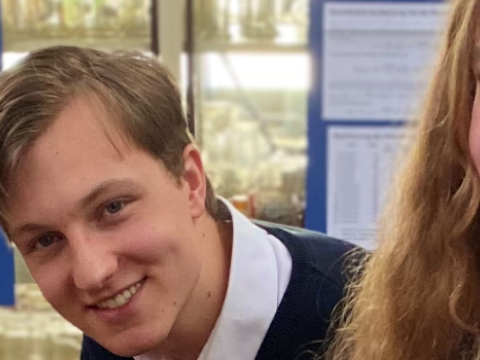
Julia Trapp and her brother Alexander from Landheim Ammersee are in the national competition of Jugend forscht 2023
It has been an exciting few months for Julia Trapp and Alexander Trapp, who have so far been very successful in the "Jugend forscht" competition and presented their research work in an impressive way. Their project on "Sustainable energy storage" impressed the jury with its innovative approach and the practicality of their solution. The Trapp siblings' project consisted of developing a new type of system for generating and storing renewable energy. Their approach is based on the biochemical process of yeast fermentation coupled with the redox reaction of methylene blue using sugar or sugary substances as an energy source.
The development of their project
Initially, the project in the 2021/2022 school year was "only" designed as an annual (scientific) project, with the annual projects firmly anchored as a building block in the curriculum of the 8th grade at Landheim Ammersee. The potential of the idea was already evident at the presentation of Julia Trapp's redox flow battery project in July 2022 in the Landheim auditorium. But the amount of work involved in realising the idea was just as obvious. So Julia brought her older brother Alexander on board and together the siblings submitted their project to Jugend forscht in the autumn. The basement at home became an experimental laboratory, the two siblings worked on their project for months and carried out numerous experiments to test their hypotheses and optimise their BioPower battery.
To start new long-term measurements, the alarm clock sometimes rang 90 minutes earlier during the week so that not a minute of measurement time was wasted... The two young adults are already very enthusiastic about their idea and therefore have a high level of intrinsic motivation: more than 1,000 hours of work have easily gone into the research project so far - in addition to the school workload, as there was no "Jugend forscht bonus" at school. The reward for their work is not only participation in the final at national level from 18 - 21 May in Bremen, but also obtaining a patent for their ground-breaking idea and enquiries from industry about costs and delivery times.
The "competition staircase" at Jugend forscht
Across Bavaria, 1,285 participants submitted 801 projects to Jugend forscht in the current application cycle. At the regional "Voralpenland" round of Jugend forscht in Schongau, Julia and Alexander impressed the jury with their presentation, which clearly illustrated their research results and explained their methods and conclusions. They were awarded first prize for this and thus qualified for the next round of the competition.
In the next stage of the competition, the state finals, they had to assert themselves against strong competition. 79 of the best young researchers from Bavaria went to the state finals in Vilsbiburg - and only 10 of them were honoured as state winners on the day. Thanks to their thorough work and careful preparation for the presentations, they once again managed to impress the jury: Julia Trapp and Alexander were awarded first place in their "Chemistry" category for their outstanding work and received the Bavarian Ministry of Education's prize for the best interdisciplinary work as well as the special "Environment" prize - which comes with an invitation to take part in the final of the national competition.
In Bavaria, the state winners of Jugend forscht are honoured each year shortly before the final of the national competition with a reception in Munich's Prinz-Carl-Palais, hosted by the head of the state chancellery - a nice gesture that shows the state winners how highly their victory is valued and which is sure to give them "backing" for the national Jugend forscht competition.
The project description
Redox-Flow Batterien haben ein großes Potential, da die Elektrolyte verlustfrei in großen Mengen gespeichert werden können. In Zeiten des Klimawandels und der Energiewende ist dies von großem Interesse. Die derzeitig gängigen Batterien basieren zumeist auf Chemikalien, die nur begrenzt zur Verfügung stehen. „…Wir haben uns die Frage gestellt, ob es möglich wäre, die Energie eines biochemischen Prozesses zu nutzen und damit eine umweltfreundliche Redox-Flow-Batterie zu bauen. Dies haben wir realisiert, indem Hefe Saccharose abbaut und dabei Methylenblau durch das entstehende NADH reduziert. Die Hefe haben wir mit Alginat immobilisiert und den Prozess von der elektrochemischen Zelle entkoppelt. Das reduzierte Methylenblau dient als Anoden-Elektrolyt in einer selbst gebauten Redox-Flow-Zelle. Vorteil dieses Systems ist, dass die Hefe permanent und unabhängig von äußeren Umwelteinflüssen durch Methylenblau-Reduktion Energie chemisch speichert, die dann auf Abruf zur Verfügung steht…“ erklärt
